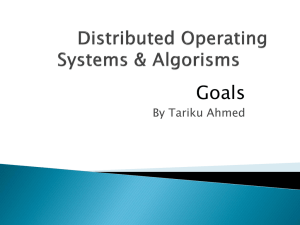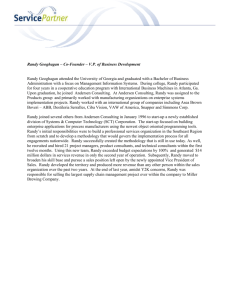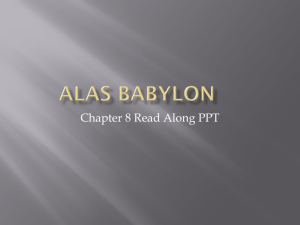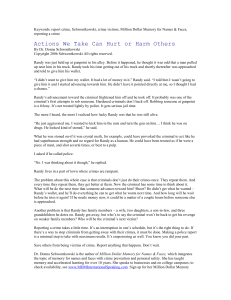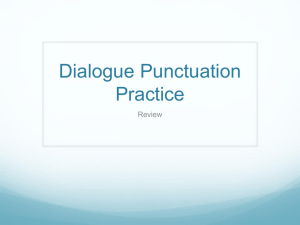Alas, Babylon
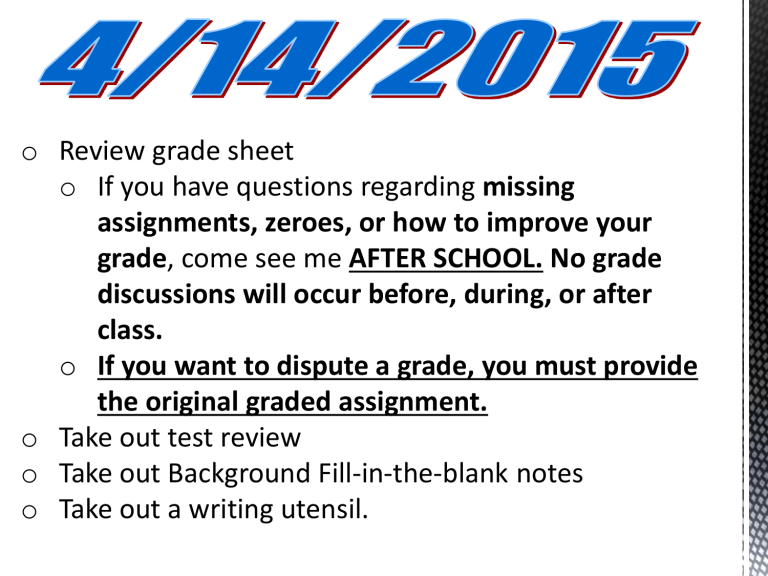
o
Review grade sheet
o
If you have questions regarding missing assignments, zeroes, or how to improve your
grade, come see me AFTER SCHOOL. No grade discussions will occur before, during, or after class.
o
If you want to dispute a grade, you must provide the original graded assignment.
o
Take out test review
o
Take out Background Fill-in-the-blank notes
o
Take out a writing utensil.
o
Background notes
o
Alas, Babylon chapters 1-10
o
30 Multiple Choice/True-False Questions
o
Study Test Review PowerPoint (this
PowerPoint)
o
Pay attention to key words and phrases bolded in blue
Get out your background notes and highlight key information from this slide.
Written by Pat Frank (pseudonym)
Real name: Harry Hart
Post-apocalyptic novel = written after a major disaster
The Domino Theory –The United States feared that if Vietnam and Korea became
Communist, other countries would follow. This caused the Cold War to get “hot” when we took sides in the Vietnam War and the Korean War.
Communism - classless society in which all property is owned by the community as a whole and where all people enjoy equal social and economic status .
Manhattan Project – Soviets infiltrated Project to steal plans for atomic bomb
The Cold War officially ended in 1989 when the Berlin Wall , which was erected after WWII to separate Soviet East Berlin and Allied West Berlin, was torn down .
Get out your background notes and highlight key information from this slide.
Fallout - consists of small dust particles that settle on the ground and contain radiation. (you can see the dust particles of the fallout)
Radiation - a type of highly concentrated atomic energy that can have devastating effects on anything it touches. (you cannot see radiation)
Sputnik – first artificial satellite launched by the Soviets in 1957.
Abbreviations
TOT – Time on Target. Launching bombs at different times so they all hit at once.
SAC – Strategic Air Command. Branch of the Air Force during the Cold War.
Civil Defense – a non-military effort to prepare Americans for military attack.
Many towns in the 1950s had Civil Defense workers who would practice drills and have information for locals about what to do in a war situation.
Western Union – A business that sends/receives telegrams
Foreshadowing – hints that something will happen later on
“Insulin requires refrigeration” – Dan Gunn mentions in Ch. 3, and then the electricity will go out at the end of Ch. 6.
Metaphor – a comparison between two unlike things not using the words like or as
Mark says that Helen “is my right arm.” He is comparing her to an essential part of himself.
“Alice, tiny, drab in black and gray, an active, angry sparrow of a woman, arrived late.”
Simile – a comparison between two unlike things using the words like or as
"Her eyes, which reflected her moods as the river reflected the sky, were gray and opaque."
"The air is like soup and the people are like noodles."
Allusion – reference to a famous person, place, historical event, or literary work
“the Good Samaritan” reference to the Bible – Randy stops to help the woman on the side of the road (she is already dead).
Riverside Inn residents compared to first-class Titanic passengers
Theme – life lesson or message being taught
“Alas, Babylon” – code phrase that means disaster and Mark and
Randy hear it for the first time at church
Florence believes Randy is spying on her, but she is actually spying on him (irony)
Randy figures out how close they are to the blasts by using the flash and sound system .
Peyton is injured (temporary retinal burns) by looking directly at the blast.
Randy drives to town to get Dan Gunn (doctor)
Riverside Inn is in a state of chaos and medical emergency.
Theme: only the strong survive
Allusion: “If the Riverside Inn sank, they must go down with the ship.” –
Titanic reference
Bank is in chaos!
People are withdrawing all of their money.
“By afternoon the law of scarcity had condemned the dollar to degradation and contempt. Within a few more days the dollar would be banished entirely.” – pg. 119
Edgar Quisenberry
“If the dollar was worthless, everything was worthless.”
“He had been a banker all his life and that’s how he was going to die, a banker.”
Commits suicide because he is unwilling to adapt to the situation.
Randy Bragg
Accident on the side of the road
“And yet Randy stopped”
He cannot abandon his humanity , so he stops to make sure there is something he can do to help the woman – she is already dead though.
Ben Franklin
“child of the atomic age”
knowledgeable about nuclear warfare
He figured out that his father was evacuating his family by sending them to Randy’s house.
Understood radiation and fallout concerns
Estimated distance of bombs
“I’m going to fill up the sinks and pails and tubs with water.”
“The Day” – pg. 123
This war is unlike others because it was all over in one day!
Radio dependence – waiting to hear from the outside world
Mrs. Josephine Vanbruuker-Brown
Secretary of Health, Education and Welfare (before the war)
PRESIDENT!
(after the war)
“There have been grave dislocations of communications, of industrial, economic, and financial functions.” – pg. 127
Puts debts and loans on hold due to the banks crumbling
Dan Gunn visits to check on Peyton and talks with Randy about the medical situation in town. Randy learns that Edgar has killed himself.
Toynbee’s Theory: “Some nations and some people melt in the heat of crisis and come apart like fat in the pan. Others meet the challenge and harden.” – pg. 133
Admiral Sam Hazzard (retired Navy officer)
He has an old ham radio that he uses to listen to military communication.
He can understand the military terminology .
Electricity goes out when Orlando is bombed
Randy Bragg
Randy refuses a drink because his priorities are changing.
“Aren’t you drinking, Randy?” - Dan
“No, I don’t feel like I want one.” – Randy
Ben Franklin
Randy gives Ben a gun for protection.
“‘You load up your gun, Ben,’ he said. ‘It’s yours now. Never point it at a man unless you intend to shoot him, and never shoot unless you mean to kill.’” – pg. 137
Ben’s loss of innocence/childhood
Loss of electricity
Water shortage solution: connect all the houses on River
Road using the artesian water well (Bragg’s house,
Henry’s house, Admiral Hazzard’s house, Florence’s house
= rely upon each other to survive )
Addicts attack Dan’s clinic looking for a drug fix.
Dan moves in to Randy’s house on River Road (theme: rely upon each other to survive).
Radio announcement of contamination zones
Lavinia McGovern dies - no refrigeration = no insulin
Bill and Lib move in to Randy’s house (theme: value in surviving as a team.)
Commotion at Florence’s house
Sir Percy (cat) ate Anthony (parrot)
Theme : “The strong survive. The frail die.” – pg. 176
Animals reverting to basic instincts.
People will do the same thing in the “new” world now that the bombs have dropped.
Randy Bragg
Rises to the challenge of leading his group and helping everyone survive.
“We’re going to have to be tough. We’re going to have to be catfish.” – Randy to Lib
Theme : Only the strongest survive!
Weak “exotic fish” versus strong catfish
Edgar/Lavinia versus Randy/Lib/Dan/Ben/Helen
Mr. Beck versus Pete Hernandez
Mr. Beck (hardware store owner) = gives Randy mason jars for free . Mr. Beck is adapting to life after the bombs.
Pete Hernandez (works at grocery store) = sells 10 pounds of salt to Randy for $200 . Pete is clinging to the old ways as he allows greed to influence his actions.
